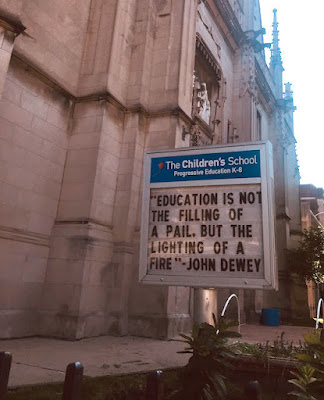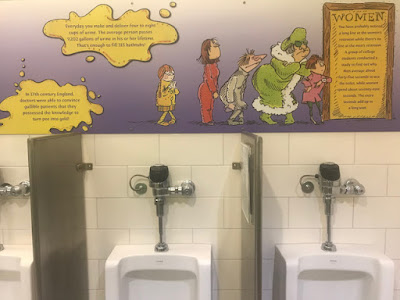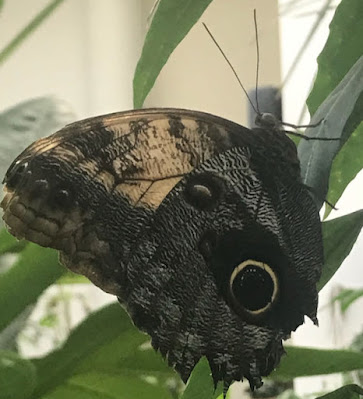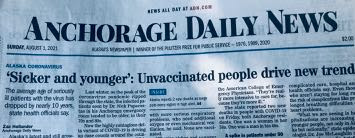As those of you who follow this blog somewhat regularly know, I've been monitoring the daily changes in Alaska's COVID-19 count. (See the COVID-19 tab above.) I've also been trying to keep up with what various people are discovering about the virus and how it spreads, both for my own personal protection as well as to be informed when I comment on our numbers.
When the Governor loosened the isolation rules for Alaska, I predicted that we would see an uptick in our numbers. And that's happening. Yesterday we had a new case high of 51 (not including non-residents) and today we blew past that with 64 new cases.
As the numbers have gone up I've been thinking about the internal conflict between wanting to be right, but wanting the virus to stay controlled, with low daily new case counts.
I can only speak about myself here. I googled "Why do people want to be right?" to see what those who study this might say, compared to what I think. But all the hits were for "Why do people NEED to be right?" That wasn't my question. All those articles talk about a culture of competition, needing to win, needing to not be wrong. Much is in the context of marriage counseling - Would you rather be right or happy? The articles talk about the complexity of issues and different perspectives which make 'being right' far more ambiguous.
But I've never been particularly competitive. When I played tennis, I cared more about playing well than who won. And I've figured out that in most cases, I don't NEED to be right. My striving tends to be for understanding. I could argue with someone about a topic and I can be pretty aggressive about it. But it's not to 'win.' It's to challenge the other person to show me the flaws in my thinking so I can get closer to the truth.
After that search for studies on why people want to be right failed, I remembered that BF Skinner had said that being right can itself a positive reinforcer. And I found
this:
"According to Skinner, simply "being effective" or "being right" may be innately reinforcing."
Though since Skinner was usually a stickler for objective proof, this seems a little soft for him. He defined a reinforcer as something that causes you to repeat a behavior, when he saw people getting the right answer repeating their actions, with no apparent rewards, he decided being right itself was the reinforcer. Not quite as objective as rats getting food by pushing a lever. But I think it is true for me.
A lot of this became much clearer when I took the
DISC - a management personality test - a long time ago and found out I was on the bottom of the Dominance scale.
For each of the four scales,
Dominance,
Influence,
Steadiness, and
Conscientiousness, there's a list of positive descriptors for each of the four characteristic and a negative list. The thesis is that when you're doing well, you would exhibit the positive aspects and when stressed, the negative aspects. For instance, if you score high in Dominance, the top of the scale was a descriptor like "Leader" on the good side and "Tyrant" on the negative side. (I'm going by the test I took over 40 years ago. I'm having trouble finding detailed descriptions of today's versions of the DISC - maybe because they want you to take the test before revealing the meaning.)
I was stunned to learn I'd scored on the bottom of the Dominance scale. My descriptor on the positive side was "Meek." If that was the positive side, I was afraid to look at the negative side. I felt better when I read the dictionary definition of meek. (When I check online definitions today, their more like what I was thinking back then - spineless.)
But basically as I remember the definition that comforted me was something about not wanting to dominate other people. So the biblical quote about the meek inheriting the earth, made more sense. I think that's a natural tendency in me that was only strengthened by living in a Buddhist country for three years.
So, when I claim that my sometimes persistent style is not about beating the other person, I have my DISC score to back me up. I don't want to be right as much as to find out what is right. If you present me with logic or evidence that is convincing, I'm happy, and I'll willingly acknowledge that you were right. (Unless you've been a real jerk about it, then I'll do it a little less willingly.)
So as I try to answer this question about why is being right so satisfying, it's not about winning. Rather, it's about having my understanding of things confirmed. Having the way I think and solve problems proven to be useful to successfully navigating the world.
Lots of things in the world, as the psychologists pointed out in the articles on 'needing to be right' just aren't right v wrong issues. There are lots of complications and shades of gray.
So when there is something where facts can bear out what your mental models predicted, it's satisfying. I think that's one reason why sports are so popular. At the end of the game there's a resolution. Your predictions about the winner or the score or the nature of the game, is known fairly quickly at the end of nine innings or four quarters.
The spread of COVID-19 is also born out with facts. Based on what the science was telling us about how the virus spread, I believed that if more people mingled in public, in closed spaces, many without masks, that our numbers would rise. And that's what's happening. (And it's why our president wants to stop testing - so the numbers won't prove him wrong. I'd note that I'm sure Trump would test over the top of the Dominance scale.)
Feeling good about predicting that our numbers would go up comes from the sense of control one gets from knowing that one can examine a situation and sort through different arguments and pick the ones that predict what actually happens. It makes me feel safer when I stay home and avoid any indoor contact with others, and limit my outdoor contact. I can lower the odds of contracting COVID-19. The risks I take are minimum - biking on sparsely populated bike trails, with a mask ready to pull up if someone approaches, ordering food online and having it delivered to the car in the parking lot. Washing my hands after getting the mail or newspaper. Probably getting a little extreme, but it doesn't take that much effort or time.
I imagine others might come up with other non-winning kinds of reasons being right feels good.
Yet I don't want our COVID-19 numbers to go up. I guess it's like betting against your favorite team - you don't want your team to lose, but if you're going to lose, you get something positive out of it. I wonder if those folks who bet on a steep drop in the stock market have mixed feelings when they win big on someone else's disaster. I suspect not. There, being right is rewarding, but mainly because it allows one to cash in.
This all gets more complicated when there are real or perceived consequence for being wrong. Politicians who downplayed what COVID-19 would do, tend to scramble to find the right language to say they were right all along, but that circumstances had changed.
And I would say, that you needed a better model that would have considered those possible circumstances and the probability they would occur.





































